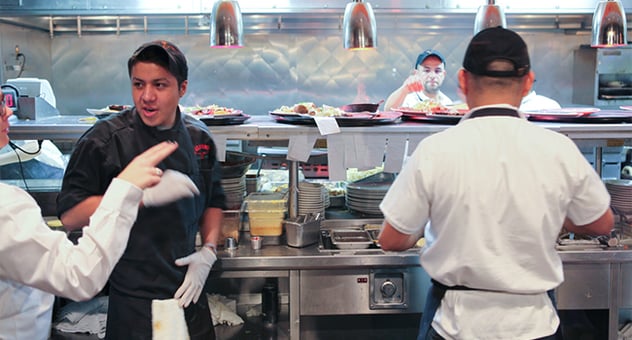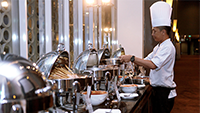We’ve all seen the movies and television shows based around the life of a chef – or set in a restaurant kitchen – where the main character’s demeanor is a little prickly.
Whether they are barking out orders, hovering a little too closely to their staff, or bringing their personal lives to work, there are a few common traits that we see played out time and time again on the big and small screens.
Maybe you know those traits a little too well. Restaurant kitchens are high-stress environments, and those at the top of the ranks have the most pressure on their shoulders.
So how can you make sure you don’t fall into the all-too-easy stereotypes of chefs under pressure? Let’s look at a few of the worst habits that chefs fall into – and how to avoid them.
Learn more in the online Typsy course: Leadership for executive chefs.
Bad habits (and how to kick them)
Micromanaging
Being micromanaged – or doing the micromanaging – can happen in almost any role, in any industry.
As a quick refresher, a leader is said to be micromanaging when they just can’t step back and trust their staff. They feel like they need to be in control and on top of everything in their domain at all times, including their staff. Sometimes, this comes from their anxieties around anything going wrong under their leadership, other times it’s just a plain old power trip.

If you’re climbing the ranks as a chef, or have already made it to the top, how can you tone it down and ensure that you aren’t making your colleagues’ lives more difficult?
One of the first steps is to learn to trust your staff. Hold back on checking in on them every five minutes, and after you’ve set a task or deadline, trust that they will complete the task – and that they will come to you if there are any problems. Giving your staff freedom isn’t going to make them run wild; it’s going to ensure that they feel comfortable and supported (from afar!) in the workplace.
A short fuse
We have all seen the trope of the angry chef played out on screen: usually male, middle-aged, shouting about how a steak is cooked or that their staff aren’t chopping or frying fast enough.
They’re overworked, incredibly stressed, and they have an impressive number of swear words in their vocabulary. They use their tempers to strike respect – or fear – in the hearts of their staff, and run their kitchens like a military base.

So how can you avoid succumbing to the biggest chef stereotype of them all?
If you know that you can be quick to get angry, have a look at why – and figure out what works for you to diffuse the situation. Do you need to walk away for a minute or two to chill out? Is it something you need to work on personally?
Think about what your demeanour might be bringing to the kitchen: are you helping or hindering your colleagues? Assess where your anger is coming from – and try to address the root cause. It’s vital that you think carefully about the way you talk to your staff if they have made a mistake or you need to have a difficult conversation.
Rather than addressing them in front of the rest of the kitchen staff, take a minute to chat to them in a quiet room, and try to hear their concerns. It can be difficult to keep your emotions in check when you’re dealing with a high-pressure environment and problems with staff, but the more empathic you are with your staff – that is, the more you give them the time and space to air their concerns and explain their side of the story – the more that they will trust you, and the easier it will be to smooth things over in the tough times.
Too much stress
If there’s one thing we can all agree on, it’s that a restaurant kitchen is a high-stress environment. It’s not a job to enter into if you are easily stressed, or if you can’t handle high-pressure situations.
So when you become a chef, how can you balance the effects of stress and trying to manage or assist in a busy kitchen? It’s easy to let the daily annoyances of a job get to you, which can in turn come out in your demeanour or leadership style at work.
From there, a run-on effect can happen: if you aren’t happy, your staff won’t be either. If your staff are stressed, they will find it difficult to support each other and you in the kitchen, and in turn, front of house staff can be affected. Whether they feel the tension in the kitchen, workflows are affected, or orders aren’t coming out correctly, those outside the confines of your working space will feel the effects too.
First up, delegate – you don’t have to do it all on your own! Next, take a half-day to sit down and review your processes. What isn’t working? Could anything be streamlined? Then, look at how you personally deal with stress at work and at home. Do you need to be looking after your own physical and mental health in a more proactive way? Many people – chefs or not – don’t realise that the way we look after ourselves at home can have a huge effect on how we process and manage stress at work.
Learning these little tips and tricks now can make a big difference on your future as a chef. They will ensure a higher retention and loyalty of your staff, a calmer and more inclusive kitchen, and a healthy working environment.
Whether you are just starting out and these concepts help you carve out your professional demeanour and goals, or you’re already at the top and know that things need to change, it’s great to get some insight into the habits that befall so many chefs across the world.
 Learn how to be an exceptional leader in the kitchen in our online course called Leadership for executive chefs at typsy.com.
Learn how to be an exceptional leader in the kitchen in our online course called Leadership for executive chefs at typsy.com.
You might also like
.gif?width=1200&height=400&name=Hubspot%20Blog%20banner%20GIF%20(2).gif)





